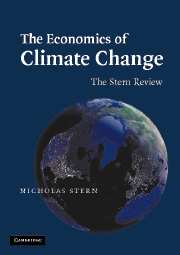Book contents
- Frontmatter
- Contents
- Preface
- Acknowledgements
- Introduction
- Summary of Conclusions
- Part I Climate Change – Our Approach
- 1 The Science of Climate Change: Scale of the Environment Challenge
- 2 Economics, Ethics and Climate Change
- 2A Ethical Frameworks and Intertemporal Equity
- Part II Impacts of Climate Change on Growth and Development
- Part III The Economics of Stabilisation
- Part IV Policy Responses for Mitigation
- Part V Policy Responses for Adaptation
- Part VI International Collective Action
- Abbreviations and Acronyms
- Postscript
- Technical Annex to Postscript
- Index
2A - Ethical Frameworks and Intertemporal Equity
Published online by Cambridge University Press: 05 March 2014
- Frontmatter
- Contents
- Preface
- Acknowledgements
- Introduction
- Summary of Conclusions
- Part I Climate Change – Our Approach
- 1 The Science of Climate Change: Scale of the Environment Challenge
- 2 Economics, Ethics and Climate Change
- 2A Ethical Frameworks and Intertemporal Equity
- Part II Impacts of Climate Change on Growth and Development
- Part III The Economics of Stabilisation
- Part IV Policy Responses for Mitigation
- Part V Policy Responses for Adaptation
- Part VI International Collective Action
- Abbreviations and Acronyms
- Postscript
- Technical Annex to Postscript
- Index
Summary
Ethical frameworks for climate change
The ‘consequentialist’ and ‘welfarist’ approach – the assessment of a policy in terms of its consequences for individual welfare – that is embodied in standard welfare economics is highly relevant to the ethics of climate change.
In Section 2.3, we described the standard approach to ethics in welfare economics i.e. the evaluation of actions in terms of their consequences for consumption by individuals of goods and services. We emphasised that ‘goods and services’ in consumption were multi-dimensional and should be interpreted broadly. In this appendix we examine that approach in a little more detail and compare it with different ethical perspectives of relevance to the economics of climate change.
For many applications of the standard theory, the community is defined as the nation-state and the decision-maker is interpreted as the government. Indeed this is often seen as sufficiently obvious as to go unstated. This is not, of course, intended to deny the complexities and pressures of political systems: the results of this approach should be seen as an ethical benchmark rather than a descriptive model of how political decisions are actually taken.
Nevertheless, questions such as ‘what do individuals value’, ‘what should be their relation to decisions and decision-making’, ‘what is the decision-making process’ and ‘who are the decision-makers’ arise immediately and strongly in the ethical analysis of climate change. These questions take us immediately to different perspectives on ethics.
Economics, together with the other social sciences, has in fact embraced a much broader perspective on the objectives of policy than that of standard welfare-economic analysis.
- Type
- Chapter
- Information
- The Economics of Climate ChangeThe Stern Review, pp. 46 - 62Publisher: Cambridge University PressPrint publication year: 2007



